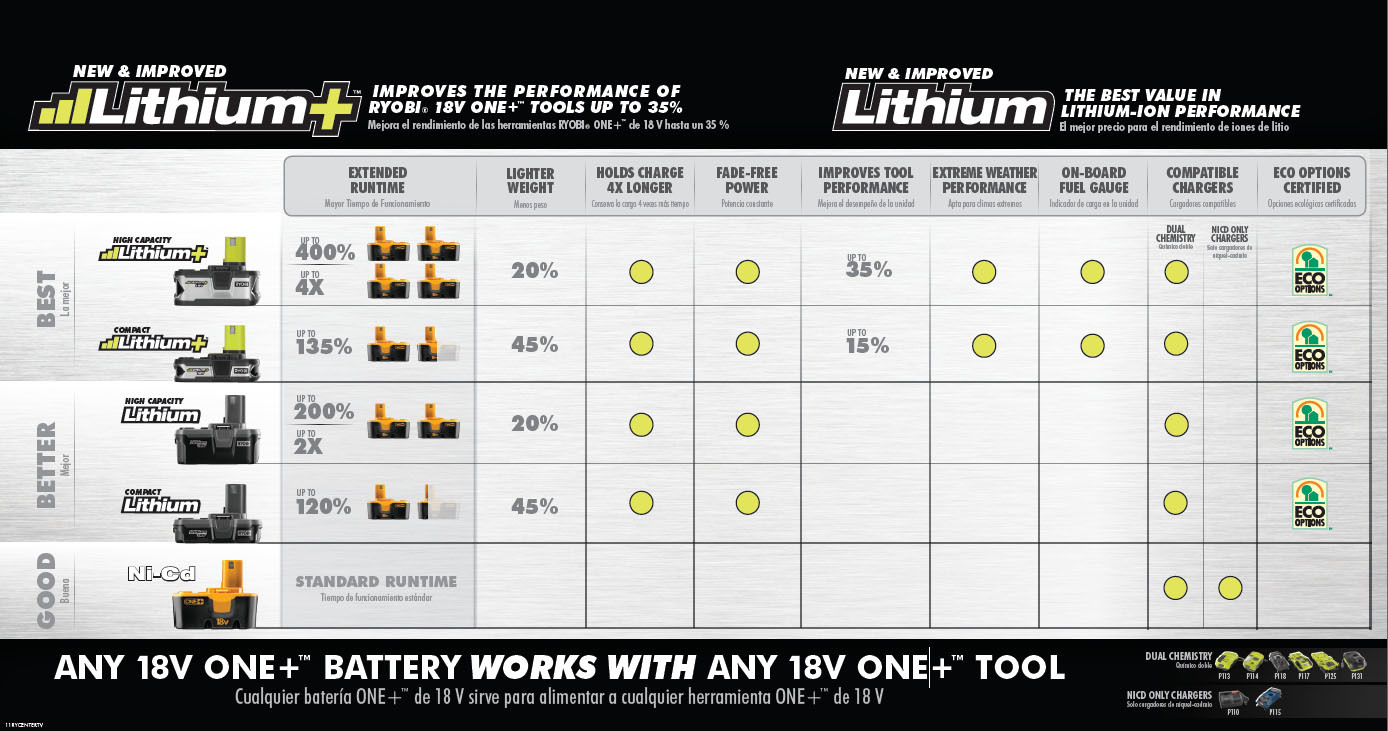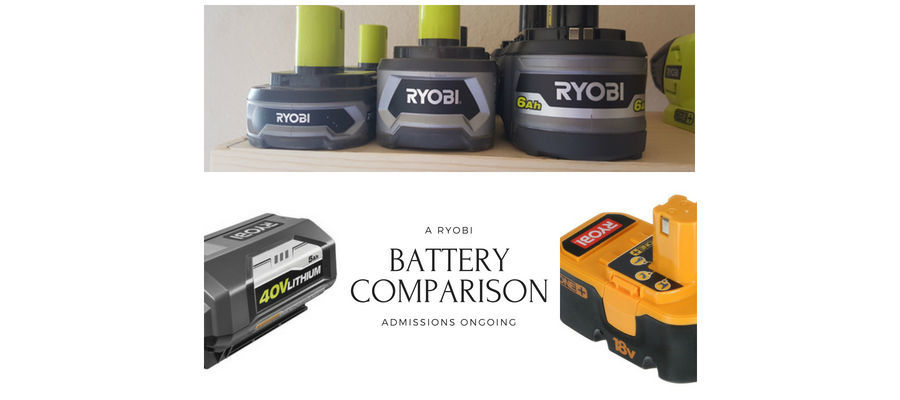
There are tons of Ryobi batteries out there nowadays and deciding on which one to go with can be confusing...
Am I Right?
I decided to make a more informative article that outlines the differences between the different Ryobi batteries to get a better understanding of them as a whole.
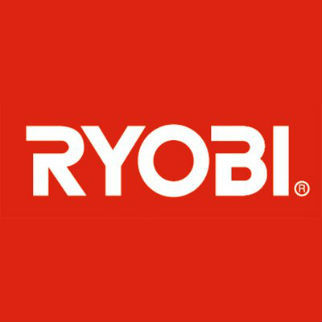
This article is going to be ever changing as new batteries become available and I will update it accordingly.
Your thoughts and suggestions will greatly help me out and are always appreciated to keep it as up to date as soon as possible.
Ryobi uses Ah as a metric that determines how long the battery will last (like other mfg.) and will determine the time the battery will power the tool for. The larger the number, the longer the runtime and usually the cost goes up as well.
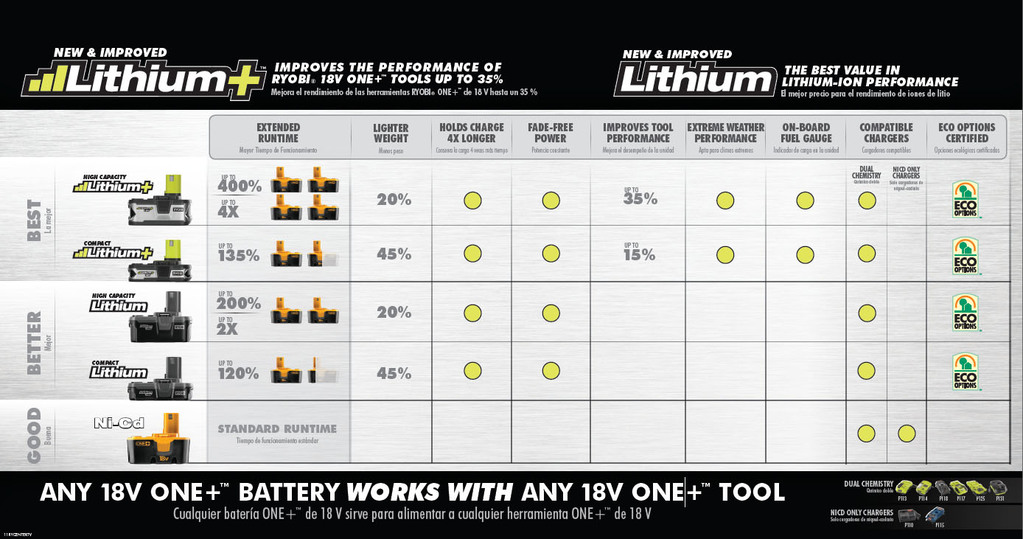
ryobitools.com
Let's Start With Ryobi's 4V & 12V Batteries...
There was only one 4V and 12V battery that was still being used by Ryobi. The 4V battery is used for Ryobi's line of 4V tools, which was pretty small and only consists of 3 power screwdrivers and an inspection camera.
Their 12V line is now down to a couple of drills that are harder to find but I can still be found on sites like Ebay and even Amazon.
There were a few different tools in the 12V lineup, as you can see in the picture on the right but are either unavailable, out of stock or just can't be found at all.
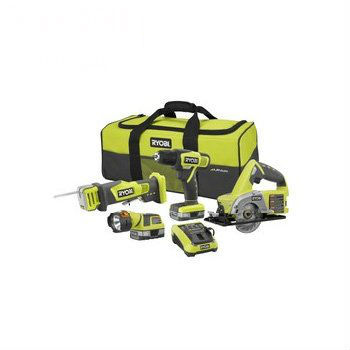
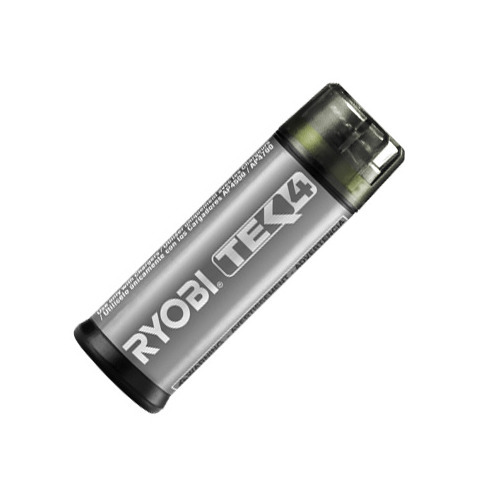
ryobitools.com
This is Ryobi's 4V battery and is named the "Tek4". Ryobi claims that one of these batteries can last longer than 6,000 AA batteries.
This is a lithium ion battery and will have that "fade free" power that other lithium ion batteries offer. Ryobi also states that their 4V battery will last for around 2,000 full charges before becoming defective.
I found the Tek4 battery for around $13 at Home Depot and the charger for it was another $12, if bought separately. I did not find a kit that included the battery and charger together though.
A Look At Ryobi's Extensive Line Of 18V Batteries:
The 18V batteries from Ryobi are much more extensive and many different models are offered that primarily have different levels of "runtime" associated with them and generally a larger Ah battery will also provide a little more juice to your tool as well.
You can find many batteries individually or available in kits that come with 1-4 batteries or in kits with a cordless tool, a battery and a charger.
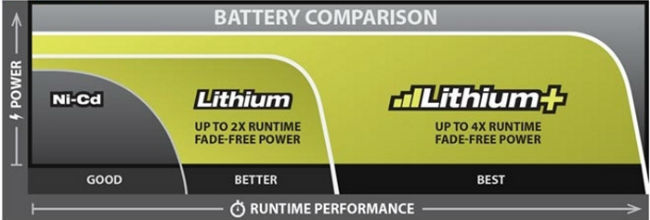
ryobitools.com
NiCad Batteries - NiCad batteries are hardly used these days by most people but are still available (only a few) and I will mention them but they are heavier, less powerful, have a much shorter life and does not provide the same "fade free" power when compared to Lithium Ion batteries.
Lithium Batteries VS Lithium+ Batteries - There are two different batteries in Ryobi's 18V lineup and these both are lithium ion batteries but offer different performance and longevity (basic difference).
The Lithium+ batteries are a little bit better than the standard lithium batteries because they last a little bit longer and have a little more juice to them than the standard lithium batteries but cost will not necessarily be very significant and is worth comparing.
You will want to look for the "+" symbol (image below) in order to recognize the Lithium+ batteries. The batteries will also have different Ah ratings (in most cases), which will make it easier to identify the two.
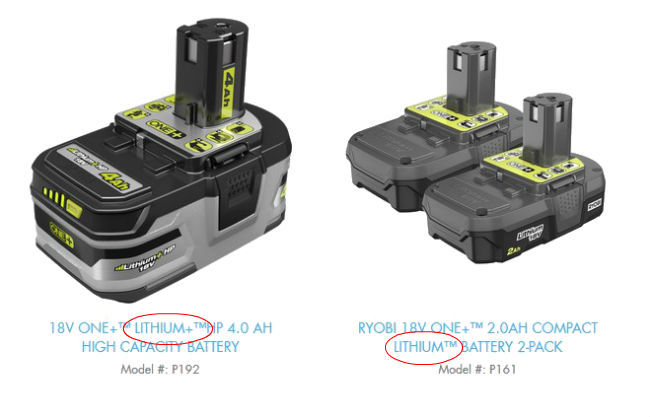
HP Batteries - The HP series batteries are designed to work with Ryobi's brushless tools that is supposed to give you greater power, be a lot more efficient and so on.
This is what Ryobi states but I can't find any more details about these batteries right now and will add more information as it comes up.
The video below explains some of the benefits of the HP series batteries that may be helpful to some people.
Ryobi's P100 Battery (NiCad):
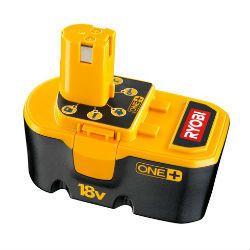
ryobitools.com
The P100 is the standard NiCad battery nowadays and is usually what Ryobi compares it's Lithium Ion batteries to.
The P100 is priced around the $50 mark and has a rating of around 1.5 Ah. This is comparable to some of the Lithium batteries (P102, P107 and P189). The P100 does not have a fuel gauge built in like the Lithium+ batteries.
The P100 is also heavier than comparable Lithium batteries, weighing in at nearly 2 lbs. The P100 requires 60 minutes of charging for a full battery and can be charged with a dual chemistry charger or a NiCad charger.
Price: | Ah Rating: | Charge: | Weight: | Type: |
|---|---|---|---|---|
$50 | 1.5 | 60 min. | 2 lbs. | NiCad |
Ryobi's P102 Battery (Lithium):
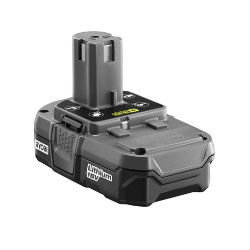
ryobitools.com
The P102 is basically the same price as the NiCad model (around $40 - $50) and was designed to be an upgraded model at the same price.
The only problem is that the P102 has been discontinued from Home Depot but can still be found at stores like Ebay and Amazon, if you are interested in buying them.
The P102 weighs in at around 1 pound and is essentially a 1.3 Ah battery. The P102 is a lithium battery but does not have the gauge that the Lithium+ models have on them.
I couldn't find a solid charge time spec for the P102 but we can assume it is probably 30 min, due to it's size and having to use a dual chemistry charger.
An example of other kits that use the P102 battery is the P2030 (string trimmer) that runs around the $70 mark, the P128 (battery and charger) that will run you somewhere around $60, the P4361 (pole saw) which costs around $130 and a couple of other kits, so plenty of options.
Price: | Ah Rating: | Charge: | Weight: | Type: |
|---|---|---|---|---|
$40-$50 | 1.3 | 30-60 min. | 1 lb. | Lithium |
Ryobi's P107 Battery (Lithium+):
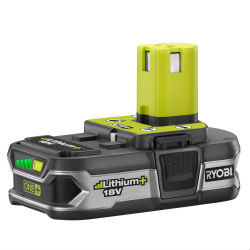
ryobitools.com
The P107 is one of the smallest Lithium+ batteries that Ryobi offers and is one of the most affordable as well, which makes sense.
The P107 can be found for around $40 - $55 for a single battery alone, a two pack (P109) for around $90 and a 4 pack of the same batteries for $130. You can also find these in combo packs of batteries (P1821).
The P107 is a 1.5 Ah battery that has the fuel gauge built in to give you an accurate measurement of the amount of juice you have left. The charge time is approximately 30 min. and the P107 weighs around 1 lb.
You can find the P107 batteries in kits as well like the P884 (combo kit) for $300, the P1822 (4 batteries) for roughly $130 or the P547 (chainsaw) for around $130 and many others.
Price: | Ah Rating: | Charge: | Weight: | Type: |
|---|---|---|---|---|
$40-$55 | 1.5 | 30 min. | 1 lb. | Lithium+ |
Ryobi's P189 Battery (Lithium):
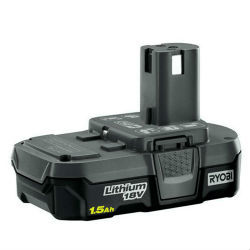
ryobitools.com
The P189 is another Lithium battery that has a little more juice to it, making it around a 1.5 Ah battery but without the fuel gauge or more advanced cells inside like you find with the same size Lithium+ battery (P107).
The price for the P189 is about the same too, which is bizarre but you will spend roughly $50 on this Lithium battery, just like you would on the Lithium+ model.
The other specs are pretty much identical to the P107 battery, with a weight of around 1 lb., 30 minute charge time with a dual chemistry charger, etc.
I could only find the P189 at Home Depot though, so availability might be restricted for some people.
Price: | Ah Rating: | Charge: | Weight: | Type: |
|---|---|---|---|---|
$50 | 1.5 | 30 min. | 1 lb. | Lithium |
Ryobi's P190 Battery (Lithium):
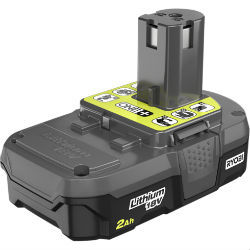
ryobitools.com
The P190 is a standard Lithium battery (so no fuel gauge) and is a little bit more expensive, coming in at around $60 but also has a little more capacity at 2.0 Ah.
The charge time for the P190 is around the 40 minute mark, which is a little bit longer than some of the smaller capacity batteries but makes sense since it has a little more capacity to it.
The weight of the P190 is about the same though at around the 1 pound mark. You can find a 2 pack of the P190 batteries (P161) for around $80 and a single battery with a charger (P163) for $70.
There are also other tools that come with a P190 battery and a charger if you would rather go that route too like the P1815 (brushless drill driver kit) for $130 and the P738KN (power inflator) for around $60.
Price: | Ah Rating: | Charge: | Weight: | Type: |
|---|---|---|---|---|
$60 | 2.0 | 40 min. | 1 lb. | Lithium |
Ryobi's P105 Battery (Lithium):
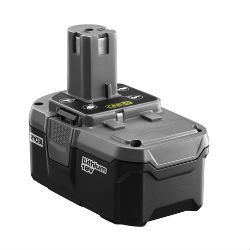
ryobitools.com
The P105 is a step up in capacity, having 2.6 Ah rating with no led fuel gauge lights mounted on it, due to the fact that it is a Lithium battery.
The P105 will cost around the $60 mark but is harder to find, as it was not available at my local Home Depot, only on Amazon and Ebay when I was looking around.
The P105 is a little heavier at 1.5 lbs. but the charge time is significantly more at around 52 minutes. Other than that the P105 is an older battery that isn't as popular as some of the other Ryobi batteries.
Price: | Ah Rating: | Charge: | Weight: | Type: |
|---|---|---|---|---|
$60 | 2.6 | 52 min. | 1.5 lbs. | Lithium |
Ryobi's P191 Battery (Lithium+):
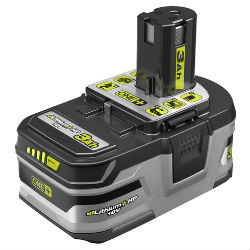
ryobitools.com
The P191 battery is a larger capacity battery (3.0 Ah) that is a Lithium+ type so you will get the better cells inside which equates to longer run times and more juice for your tools.
The P191 is also an HP type of battery which means it will really shine with Ryobi's brushless tools.
The price for the P191 is around the $80 mark and as far as I have seen, it does not come in a kit, so far.
The weight of the P191 is around 1.8 lbs, so a little heavier but much more capacity too, so it is relative. You can expect a charge time of around 60 minutes for the P191 with a dual chemistry charger.
It is worth noting that the HP power does not work with brushless lawn and garden Ryobi tools.
Price: | Ah Rating: | Charge: | Weight: | Type: |
|---|---|---|---|---|
$80 | 3.0 | 60 min. | 1.83 lbs. | Lithium+ (HP) |
Ryobi's P108 Battery (Lithium+):
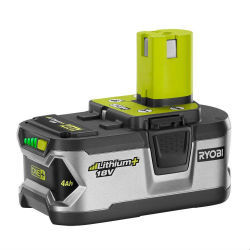
ryobitools.com
The P108 is a popular battery because it is a Lithium+ battery with a rating of 4.0 Ah, making it a higher capacity battery able to handle some more demanding cordless tools. The battery alone will run you around $100.
The P108 is a popular battery and can be found in many different kits, like the P1822 (4 battery kit) that runs around $130, the P1813 (brushless drill driver) which is around the $150 mark or the P1894 (combo kit) which is much more, coming in at around $500.
The weight for the P108 comes in at around 1.5 lbs. which isn't that bad for a higher capacity battery and the charge time is around 60 minutes, similar to smaller capacity batteries.
Price: | Ah Rating: | Charge: | Weight: | Type: |
|---|---|---|---|---|
$100 | 4.0 | 60 min. | 1.5 lbs. | Lithium+ |
Ryobi's P192 Battery (Lithium+):
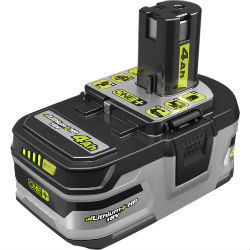
ryobitools.com
The P192 is almost identical to the P108 in every aspect being a Lithium+ battery with the fuel gauge and having a capacity of 4.0 Ah but it is also a HP model which makes it more efficient and last longer and compliments Ryobi's brushless tools.
There is no price for the P192 yet, seeing as how it is not available yet (8/2018) but I will update this article as soon as it becomes available.
I expect to see some of the same specs as the P108 for the P192 as far as weight, charge time, etc. are concerned but can't find any info at the moment for the battery.
Price: | Ah Rating: | Charge: | Weight: | Type: |
|---|---|---|---|---|
??? | 4.0 | ??? min. | ??? lbs. | Lithium+ (HP) |
Ryobi's P193 Battery (Lithium+):
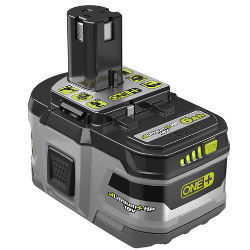
ryobitools.com
Ryobi's P193 is a massive 6.0 Ah battery that is designed for higher demand tools that require a lot more juice and extended run times. The P193 is a Lithium+ battery and an HP model as well, so it works very well in Ryobi's brushless cordless tools.
I was only able to find a single battery on Amazon (around $100) and a 2 pack of the P193 batteries at Home Depot but it was around the $130 price range, which is a pretty screaming deal, considering that that is nearly the same price for any other of the Ryobi batteries bought individually!
Keep in mind that these 6.0 Ah batteries will take a full 2 hours to charge (120 min.) which may be unappealing to some people. The weight of these batteries are going to be heavier too, weighing in at around 2 lbs.
Price: | Ah Rating: | Charge: | Weight: | Type: |
|---|---|---|---|---|
$100-$130 | 6.0 | 120 min. | 2 lbs. | Lithium+ (HP) |
Ryobi's P194 Battery (Lithium+):
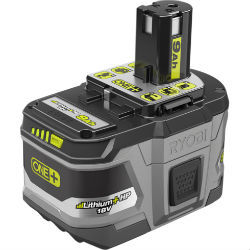
ryobitools.com
Ryobi's P194 is their largest battery that they are coming out with and is made for the most demanding cordless tools.
The P194 is a Lithium+ battery (with led fuel gauge) and is also a HP model so it is more efficient and compliments Ryobi's brushless tools, which is what is was made to do in the first place.
The P194 is not yet available so there are no specifics for it yet but I will update this article as soon as it becomes available.
Price: | Ah Rating: | Charge: | Weight: | Type: |
|---|---|---|---|---|
??? | 9.0 | ??? min. | ??? lbs. | Lithium+ (HP) |
Lets Move Onto Ryobi's 40V Batteries...
Ryobi's 40V batteries are all very similar when it comes to weight, charge time and features but the capacity is where they differ and of course, with that comes a price difference as well.
The 40V Lineup - Ryobi has 5 different 40V batteries out right now (at the time I wrote this) and they range in capacity from 1.5 Ah to 5.0 Ah batteries.
They have a 1.5, 2.6, 3.0, 4.0 and a 5.0 Ah battery available but you may have to look around at different retailers to find specific models.
Availability - The 2.6 and 5.0 Ah batteries were available individually at Home Depot and the other three batteries were found on other sites like Ebay and Amazon.
The availability was a little hit and miss if you want to buy the batteries individually but some kits that had a cordless tool, a charger and a 40V battery were more common and usually a better bargain too.
Ryobi's (40V) OP4015 Battery (Lithium):
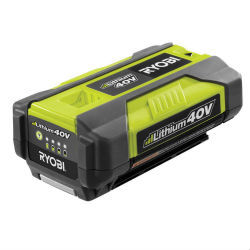
ryobitools.com
The OP4015 is the smallest 40V battery that Ryobi offers and is a 1.5 Ah battery. The OP4015 is not offered by Home Depot (when I checked) but could be found on Amazon for around $100.
There are a few different kits that utilize the OP4015 battery like the RY40240 (string trimmer) and the RY40511 (40V chainsaw) which will include the battery, a charger and the tool for a better overall price.
The weight of the OP4015 is around 2 lbs. in total and is said to charge in under 2 hours but I was not able to get a more accurate time other than that.
This 40V battery does have a led fuel gauge mounted on the back, like all of the 40V batteries offered by Ryobi.
Price: | Ah Rating: | Charge: | Weight: | Type: |
|---|---|---|---|---|
$100 | 1.5 | <120 min. | 2 lbs. | Lithium |
Ryobi's (40V) OP4026 Battery (Lithium):
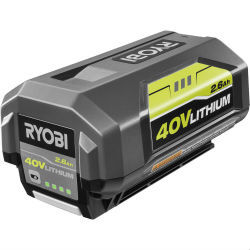
ryobitools.com
Next up is the OP4026A which is a common 40V battery used for a number of different tools. It is priced at around the $100 mark for the battery alone.
There are a few kits available that come with the OP4026A and the bundle deal is usually more enticing. The RY40210B and RY40220 are both string trimmers that use the OP4016A battery and range between $120 and $170, including a charger and the tools.
The OP4026 weighs approximately 3 lbs. and has the fuel gauge on the back, like the other 40V batteries. You can find the OP4026A just about anywhere including Home Depot, Amazon, Ebay, etc.
The charge time is around the 90 minute mark, so keep this in mind.
Price: | Ah Rating: | Charge: | Weight: | Type: |
|---|---|---|---|---|
$100 | 2.6 | 90 min. | 3.05 lbs. | Lithium |
Ryobi's (40V) OP4030 Battery (Lithium):
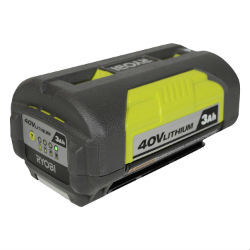
ryobitools.com
The OP4030 is a step up from the 2.6 Ah battery and has a little more capacity at 3.0 Ah.
I found the OP4030 battery and charger on Ebay for $150 but was not available at Home Depot when I was looking and Amazon had it but I did not see a price listed, so it was only available from third party sellers, which is usually higher priced.
The OP4030 is available in some kits like the RY40230 (brushless string trimmer) or the RY40430 (40V blower) that come with a tool, a charger and the OP4030 battery for a much better price ($160 - $200). The weight is close to the 2.6 Ah battery at around the 3 pound mark and a charge time of around 90 minutes too.
Price: | Ah Rating: | Charge: | Weight: | Type: |
|---|---|---|---|---|
??? | 3.0 | 90 min. | 3+ lbs. | Lithium |
Ryobi's (40V) OP4040 Battery (Lithium):
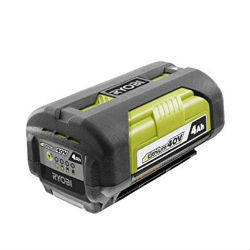
ryobitools.com
The OP4040 was not available at Home Depot when doing my research but I did find it at Walmart (?), Ebay (now unavail.) and Amazon and the price ranged from $150 - $160 for the battery alone.
I did find a couple of kits that included the 4.0 Ah battery though, like the RY40140 (cordless lawnmower) priced at $280 or the RY40140-4X (lawnmower and blower combo) that is around $370. The kits include 1 battery (OP4040), a charger and the tool(s).
The OP4040 takes a little longer to charge than the other 40V batteries we looked at already taking around 2 hours to fully charge the battery. I could not find the weight of the battery anywhere though and will post it when I find out.
Price: | Ah Rating: | Charge: | Weight: | Type: |
|---|---|---|---|---|
$150-$160 | 4.0 | 120 min. | ??? | Lithium |
Ryobi's (40V) OP4050 Battery (Lithium):
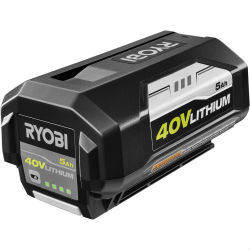
ryobitools.com
The OP4050 40V battery is a higher capacity battery that can handle larger, more demanding tasks for the 40V cordless tools. Home Depot had the OP4050 listed for around $140 and this was just the battery itself and nothing else.
I was able to find a couple of combo kits that included the 5.0 Ah battery, a charger and a lawnmower (RY40180-Y) for $280 and the RY40190-Y for $400 but did not find any other combo kits that included the 5.0 Ah battery.
The weight for the OP4050 came in at around 3.5 lbs which is one of the heaviest 40V batteries but it does have the most capacity as well, so it makes sense.
The charge time (after the initial charge) is around the 90 minute mark and I assume that the initial charge probably takes a little longer but am not quite sure.
Price: | Ah Rating: | Charge: | Weight: | Type: |
|---|---|---|---|---|
$140 | 5.0 | 90 min. | 3.5 lbs. | Lithium |


